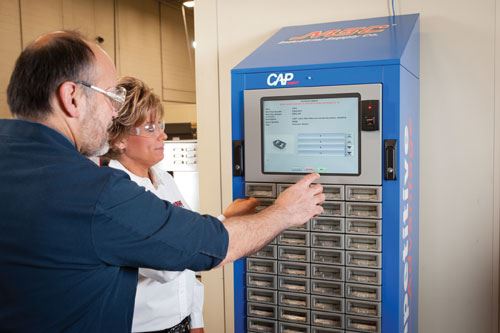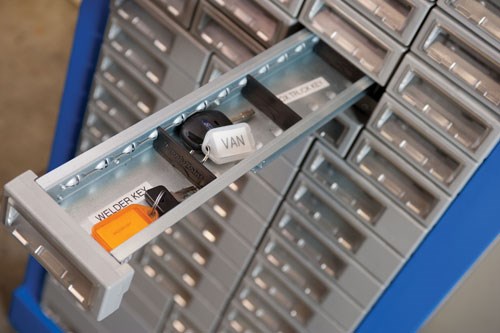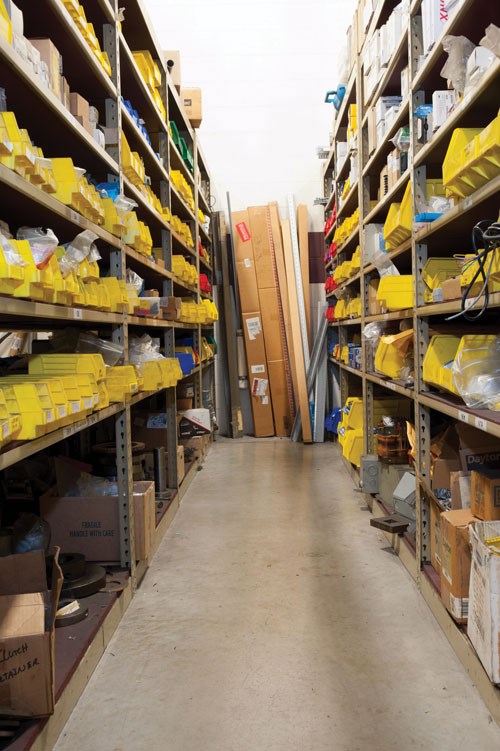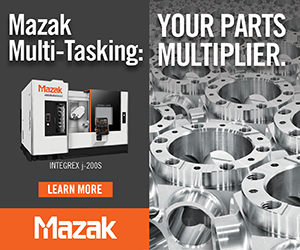Published
Vending System Benefits Go Beyond Tool Management
When management at Transfer Tool Products needed a way to track inventory levels and tool use, they relied on the CAP Vending Unit from MSC Industrial Supply. The vending machine has improved training, increased profits and freed floor space.
Employees at Transfer Tool Products initially mistook management’s efforts to more carefully monitor tool use as just another “Big Brother” watchdog attempt, says Brent Busscher, controller. However, they soon learned that the single-bay competitive advantage program (CAP) vending unit from MSC Industrial Supply (Melville, New York), was installed not as a way to spy on them, but as a way to cut back on tool inventory. Surprisingly, they also realized that the foe-turned-friend tuned management in to their specific training needs, a value that worked to the employees’ benefit.
Transfer Tool has specialized in developing and manufacturing deep-drawn metal stampings at its Grand Haven, Michigan facility since 1985. The company provides precision parts made from steel, stainless steel, brass, aluminum and other alloys to customers in a variety of industries, including automotive, energy, hardware and electronics. This work often involves high-volume runs of small, custom parts ranging to 10 inches in diameter. In order to productively produce these parts, the company needed a way to accurately organize and manage the tools and supplies it uses on a daily basis.
Before installing the CAP vending unit, Transfer Tool would rely on the person who took the last of a certain item to alert the toolroom about a reorder, says Bob Peterson, toolroom supervisor. The company had no way of knowing where the employee was taking the tooling or why he or she was doing so. Mr. Peterson says the company installed the single-bay CAP vending unit not to question employee honesty, but instead to track patterns of certain tools or items that were frequently requested.
For instance, one worker continually ordered gloves. When managers asked why he needed so many in such a short time-frame, they learned that he thought he was supposed to replace his gloves daily. With this information, managers at Transfer Tool had discovered a hidden benefit of the vending unit: It unearthed areas in which employees could use extra training. “Right there, we knew that our people were not only honest, but in need of additional instruction about the life expectancy of even everyday supplies, let alone expensive tools,” Mr. Busscher says.
Not only does the CAP vending unit reveal areas in which more training is needed, but it also enables the company to limit access to employees without proper credentials. For instance, only those with a chauffer’s license can drive the box truck. The CAP vending unit, which houses the box truck keys, will allow only those with the proper approval to access the key drawer. This eliminates the possibility of those without a chauffer’s license having access to the truck. The system also documents how long the truck is being used. When tools or other supplies are needed, the requestor simply swipes his or her card in the CAP vending unit and views the selection on a large, colorful monitor. Once selected, the appropriate drawer opens.
The vending machine is a drawer-based system, meaning that tools do not drop like they do in a typical coil machine, so there is no tool breakage. This is especially important for the expensive power tools and $90 sensors that Transfer stores within the machine. No repackaging is necessary, either. These tools and supplies were previously stored in rows of cluttered bins and shelving. Employees would spend non-value-added time searching aisles and aisles of widely scattered supplies. “Not only were these rows extremely cluttered, but labels were barely legible after just a few fingers left their prints,” Mr. Peterson says.
The CAP unit dispenses the exact amount of the requested item, so inventory levels are no longer a mystery, and the days of forgetting to tell someone when the last of an item is used are a thing of the past. “Stockouts were simply a too-often occurrence for us,” Mr. Peterson says. The CAP unit takes all such replenishment and logistical responsibility out of employees’ hands by monitoring and tracking all tool requests, he says. The system automatically generates a weekly replacement order directly to MSC.
Mr. Busscher gets monthly inventory value charts to show just what’s in the CAP machine. Since installing the unit, the company has realized a 15-percent drop in the amount of overall tooling inventory because he gets exact-usage reports. Before installing the vending system, the company was carrying more tooling than it actually required. Now that Mr. Busscher knows what they have and what is needed, there are no more surprises, he says. Even more importantly, Lola Brophy, MSC sales associate, Chad Shawver, MSC CAP specialist, and Matt Dutkiewicz, MSC vending representative, regularly team up to gage all activity on the tool dispenser and make sure it is stocked with the items Transfer Tool needs, Mr. Busscher says.
By replacing multiple bins and shelves with the one-bay system, the company has conquered another major challenge: finding the floor space to add new machine tools needed to support aggressive sales-growth goals. Consolidation efforts are an ongoing project at Transfer Tool. Mr. Busscher says that very soon, the company will implement its second bay, which promises to easily attach to the existing unit. Doing so will further eliminate additional rows of tool bins to free valuable real estate that’s urgently needed for even more equipment. “CAP has led to a much cleaner, better organized workplace—period,” Mr. Peterson says.
Read Next
3 Mistakes That Cause CNC Programs to Fail
Despite enhancements to manufacturing technology, there are still issues today that can cause programs to fail. These failures can cause lost time, scrapped parts, damaged machines and even injured operators.
Read More
Vertical Machining Centers
The Cut Scene: The Finer Details of Large-Format Machining
Small details and features can have an outsized impact on large parts, such as Barbco’s collapsible utility drill head.
Read More








.png;maxWidth=300;quality=90)











